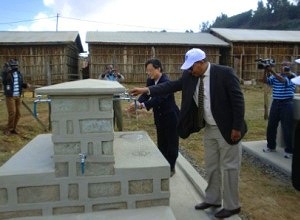|

|
|

|
| Ambassador's Speech>2012 >121218 | ||||
|
 |
|||
| at the Inauguration Ceremony for the Project for Rural Water Supply in Oromia in Galessa Kebeke, Dandi Woreda, West Showa Zone, Oromia Region on 18 December, 2012 |
||||
| Ato Motumma Mekassa, Head of Water, Minerals and Energy Bureau, Oromia Regional Government, Ato Lechissa Hayu, Administrator of West Showa Zone, Distinguished Guests, Community Members of the Dandi Woreda, JICA and other Japanese colleagues, Ladies and Gentlemen, Endemen Aderachehu. Akkam Bultan. I am most grateful to all of you for your very warm welcome today. This is my 5th trip to the western part of Oromia, and I have been looking forward to visiting the Dandi Woreda and seeing you all. Now, it is a great pleasure for me to have this opportunity to attend the inauguration ceremony to celebrate the completion of the Project for Rural Water Supply in the Oromia Regional State. Water, particularly safe water, is indispensible for our daily lives, and water supply is crucial for agricultural development as well. Therefore, I would like to congratulate the people and the Regional Government of Oromia on this special day, for which you must have been waiting a long time. This water supply project was started in April 2010, based upon the Exchange of Notes signed between our two Governments on 16 July, 2009. The total amount of grant Japan extended for this project was 1,029 million JPY, equivalent to about 223 million ETB at the current exchange rate*. Ladies and Gentlemen, Improving access to safe water is an important policy objective in Ethiopia. Indeed, enormous efforts were made by the federal and regional governments during the PASDEP period (2005/06-2009/10). As a result, access to potable water substantially improved from 36% to 68.5% on the national average. However, the gap between urban and rural areas remained large. In many local communities, therefore, access to potable water was still a great challenge, and the western part of Oromia was no exception. Access to water in the rural areas of Oromia improved from 28.9% in 2005/06 to 42.9% in 2009/10 but was still lower than the national average of 65.8%. The situation in the targeted areas of this project in West Showa, Horo Guduru and Jimma was even worse as not only was your access to water limited but you had to depend on unprotected water. Because of this, waterborne diseases prevailed, causing serious effects among you. In addition, women and children were forced to perform the heavy workload of fetching water, walking long distances every day. This deprived school-age children, particularly girls, of an opportunity to have education at school. Through this project, 82 water supply facilities have been developed in 17 woredas in West Showa, Horo Guduru and Jimma Zones. Out of this, 67 are deep wells with nine operated by electric motor pumps, and 15 are water supply facilities utilizing natural springs. 14 water storage ponds, three elevated water storage tanks, a number of water pipelines totaling 80 km and 148 water distribution points have also been installed. In addition, some equipment necessary for the management of these facilities such as water quality analysis kits and motor bikes have been provided to the respective communities. This project aimed at increasing the number of residents that can enjoy a safe and reliable water supply. As a result of this project, it is estimated that about 100,000 residents in 46 villages in 17 woredas in those three zones will benefit, and the safe water coverage is expected to increase substantially. Ladies and Gentlemen, The Growth and Transformation Plan(GTP) has also attached importance to access to safe water, planning to increase the coverage from 68.5% to 98.5% at the national level in five years. This target is well on track as potable water supply coverage at the national level improved to 73.5% during the first year of the GTP. A similar improvement occurred in Oromia where the coverage increased from 54.1% to 59.5% during the same period. Today, we are celebrating a small but important step by improving access to safe water in several rural areas in Oromia. However, the task still requires continued efforts by the Ethiopian Government and its development partners. In this respect, Japan, as a long standing supporter of the water sector in Ethiopia, will remain firm to support the implementation of the GTP program. Finally, I would like to share my sincere hope that the facilities and equipment, which have been completed and handed over, should be used effectively and efficiently while maintained in good condition. Furthermore, the village water committees that have been established should be activated, and sanitary education should be continued. I am sure that improved access to safe water will make a substantial contribution to improving the livelihoods of the residents in the respective communities. Amesegenalehu! Galatoomaa! Fayyaa ta’a! *Exchange Rate: 1¥ = 0.2163 ETB, as of 17December, 2012 (Mid-rate) |
||||
|
||||
| Press Release on this project | ||||